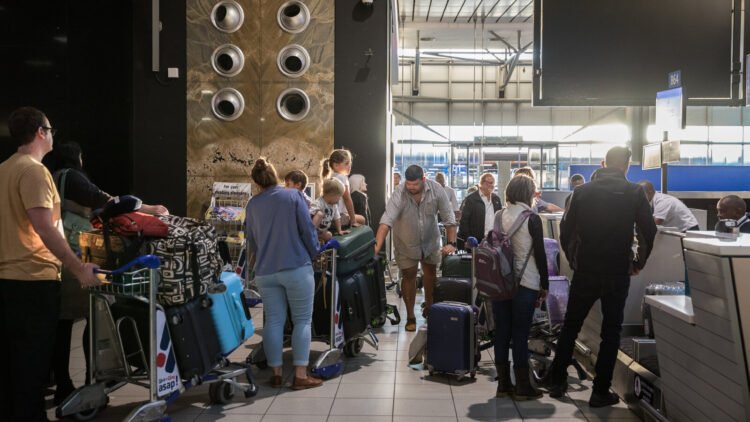Dulles, Virginia | May 12, 2025
In a move stirring international controversy, 49 white South Africans — mostly Afrikaner families with children — landed at Washington Dulles International Airport early Monday aboard a privately chartered flight from Johannesburg, marking the first wave of a U.S.-backed refugee program initiated under an executive order signed by President Donald Trump in February.
The group was received at a hangar at Atlantic Aviation near the airport by senior U.S. officials, including Deputy Secretary of State Christopher Landau and Deputy Homeland Security Secretary Troy Edgar. The arrivals come as part of a controversial initiative that the Trump administration claims addresses “racially motivated persecution” of Afrikaners in South Africa.
“This is about stopping a tragedy,” Trump said at a press briefing Monday, doubling down on his earlier claims that white Afrikaner farmers are being “brutally killed” and forced off their land under a new South African law enabling land seizures without compensation.
“They are being killed,” Trump told reporters. “It’s a genocide that’s taking place… and nobody wants to talk about it.”
The president cited the Expropriation Act 13 of 2024, a recent law passed by South Africa’s parliament that permits the uncompensated seizure of land for redistribution, as a core reason for his administration’s emergency relocation policy. The law, which the South African government says targets unused land and is designed to address deep-rooted historical inequalities, has drawn fierce criticism from right-wing commentators abroad — and now, direct action from the White House.
Trump’s remarks, however, have drawn condemnation from Pretoria. A spokesperson for the South African Ministry of Transport, Collen Msibi, confirmed the group’s departure but rejected Washington’s rationale, calling the U.S. accusations “completely false” and “deeply misleading.”
“Afrikaners are not persecuted in South Africa,” Msibi said. “They remain among the most economically privileged communities in the country.”
Afrikaners — descendants of Dutch, German, and French settlers — number about 2.7 million in a country of 62 million people, over 80% of whom are Black. Despite their minority status, Afrikaners are widely represented in business, politics, and culture. Afrikaans, their primary language, is one of South Africa’s 11 official languages and is spoken beyond Afrikaner communities.
Still, the Trump administration, alongside outspoken tech mogul Elon Musk — a South African-born U.S. citizen and vocal critic of the ANC government — has maintained that Afrikaner farmers face racially driven violence, citing farm murders and alleged government inaction.
The South African government counters these claims with crime data showing farm attacks affect all racial groups and account for a small fraction of the country’s overall violent crime, which remains one of the highest globally.
“We reject the framing of these crimes as ethnic cleansing,” said a spokesperson for South Africa’s presidency. “This narrative is part of a dangerous disinformation campaign.”
Despite the pushback, the Trump administration has pledged to expand the refugee initiative and hinted that additional groups of Afrikaners may soon be relocated to the U.S.
Trump also announced plans to meet with South African leaders during an upcoming G20 summit — though he cast doubt on his participation if, as he put it, “that situation isn’t taken care of.”
“I don’t care about race or color,” the president added. “What I care about is people being safe — and what’s happening in South Africa is a disgrace.”
As the newly arrived South Africans listened quietly to welcome remarks in the hangar, the broader diplomatic fallout was already unfolding, with critics accusing Trump of exploiting racial tensions for political gain and violating established refugee protocols.
The resettlement move has further inflamed debate around U.S. immigration policy — particularly given the administration’s simultaneous mass deportation efforts targeting undocumented migrants, many of whom have lived legally in the U.S. for years.
For now, the 49 Afrikaners will begin new lives on American soil, under a spotlight that is unlikely to dim as international scrutiny and political tension mount.

 English
English



























































